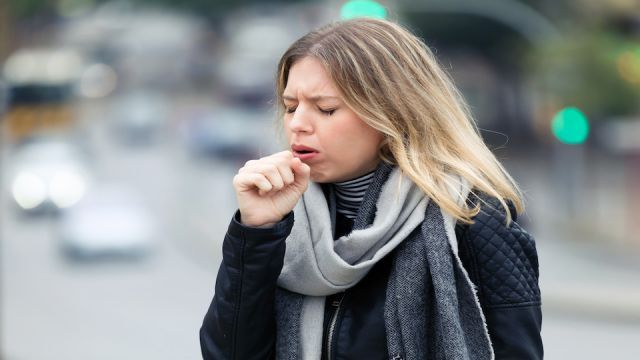
Coughing is one of those irritating symptoms that usually indicates a deeper health concern. Often, it can be hard to isolate the cough and figure out exactly why you are experiencing this uncomfortable condition. Many people simply reach for the cough syrup without a second thought, searching for some measure of relief. However, it is essential that you understand what different coughs mean and what they reveal about your health.
Any kind of cough is merely the body’s natural defense mechanism. When you cough, your body is trying to remove foreign or unwanted objects from your airway. In short, it is the final protective barrier between your mouth and lungs and is an essential tool for keeping a healthy airway.
Though it is difficult to pinpoint the source of a cough without medical intervention, these common conditions are often directly related to distinctive coughs that can help you narrow down an underlying cause.
Pneumonia
Identifying factors: Usually a dry cough at first and turns into a wet cough with green, yellow, red, or rust-tinged mucus. The wet cough usually develops after a few days.
This is a bacterial or viral infection of the lungs and will be treated accordingly by your primary care physician. If it is bacterial, your doctor will usually prescribe antibiotics. Viral pneumonia is treated simply with rest and time. Keep in mind that you should always spit out extra mucus, as swallowing it can lead to an irritated stomach lining.
If you have pneumonia you may also experience fever, chills, trouble breathing, and pain when breathing in deeply or coughing.
COPD
Identifying factors: This is usually a hacking cough that produces excessive amounts of mucus in the morning and often gets better as the day progresses.
COPD, or chronic obstructive pulmonary disease is usually caused and exacerbated by smoking. This is a disease that includes both chronic bronchitis and emphysema. Emphysema causes the air sacs in your lungs to lose elasticity while chronic bronchitis is due to swelling in the lining of the lungs. COPD is usually treated with medication such as bronchodilators and inhaled steroids. It is also essential to stop smoking and depending on the severity, you may need oxygen therapy to restore lung health.
If you have COPD you may also notice persistent shortness of breath that is worsened with physical activity, chest tightness, wheezing, and fatigue.
Asthma
Identifying factors: An asthmatic cough is usually a dry cough with a rattling or wheezing sound present in the lungs. It usually worsens with exercise or at night.
Asthma can be a serious condition and should not be taken lightly. If you suspect asthma, it is important to get a diagnosis from your doctor and begin to focus on taking deep, full breaths as soon as possible.
This condition causes inflamed airways and may be accompanied by fatigue, shortness of breath, and chest tightness.
Postnasal Drip
Identifying factors: This can be either a wet or dry cough and is caused by mucus trickling down the back of the throat and irritating nerve endings.
Postnasal drip is due to allergies or a cold and is the most common type of cough. A cough related to allergies may also be accompanied by sneezing or itching while cold symptoms may cause congestion and a sore throat. You may also notice that your cough gets worse at night.
Time and patience will usually remedy the common cold, and a spoonful of local, raw honey before bed can help you sleep. If you suspect an allergy, try avoiding the source and consider taking an over the counter antihistamine.
GERD
Indicating factors: Dry, spasmodic cough that usually starts or becomes worse when you are lying down or eating.
GERD, or more commonly known as acid reflux, occurs when acid from your stomach backs up into your esophagus. This condition is the second most common cause of chronic coughing, comprising about 40% of cases. When food passes through the esophagus into the stomach, a valve, known as the lower esophageal sphincter (LES) closes, which prevents food or acid from coming back up the throat. GERD is caused by an untimed relaxation of the LES which causes acid to flow backward from the stomach.
In 75% of cases, chronic cough is the only symptom of acid reflux, so it is vital to be aware of this condition. Treatments vary, so it is best to consult your doctor for an appropriate diagnosis and course of action regarding GERD.
-The Alternative Daily

